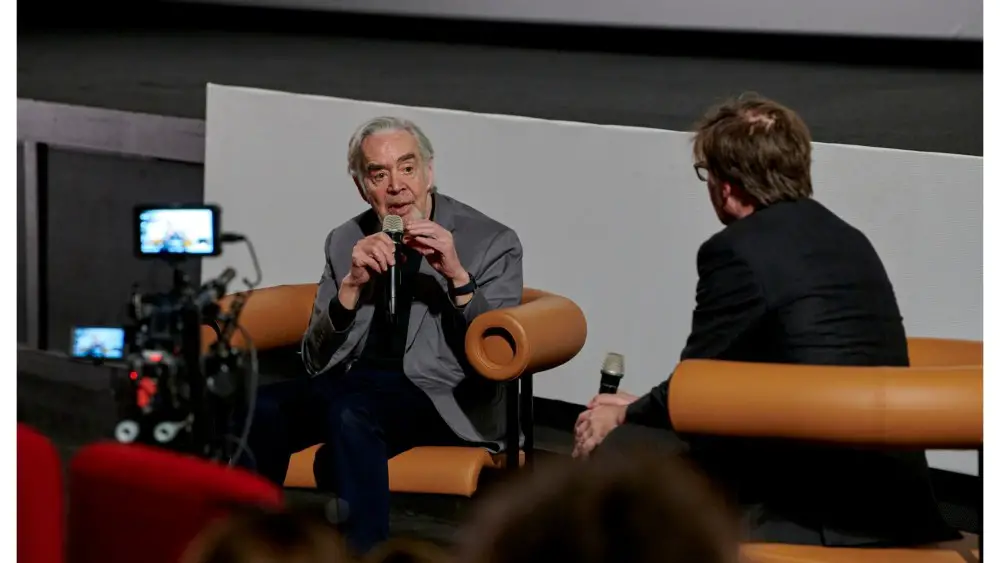Composer Howard Shore likes to sleep on it.
“I try to get in touch with my inner feelings,” he said at the Zurich Film Festival, explaining his preferred method of working.
“When you think about movies, you go into a dark room and all sorts of images start appearing. You’re in a dream-like state, so I like to use that idea when writing music for movies. Even taking a nap. Include, but be very relaxed and try to imagine what the piece would look like. Then I started using a pencil to create an actual score of what I was dreaming up. ” he said.
“I’m not studying film, I’m listening to film. I listen to the rhythms and sounds of the actors. I imagine visualizations and write this more abstract idea in my head. Masu.”
Shore, a three-time Oscar winner, received the Career Achievement Award at the Swiss festival, where he spoke about his collaboration with fellow Canadian David Cronenberg and his work on director Peter Jackson’s The Lord of the Rings. He excited his fans with a small story.
“The first recordings were made at City Hall in Wellington, New Zealand. We then ended up using a sound mixing room set up by the government. Mine was an unusual shape, almost like a coffin. “It was like,” he recalled.
“I worked with [screenwriter] Philippa Boyen, Tolkien’s language expert, very carefully helped me use Tolkien’s language. It was Tolkien’s way of translating the ideas he had in his books into music. I brought this poem and lyrics back into the film. I think that gave it even more depth. ”
Although it is a trilogy, he views LOTR as “one work.”
“After the war, there was a shortage of paper, so it was released in three parts. But it was made as one story, and I worked on it as one story. Peter did the same thing when he was making the film. “I was doing that,” he said.
“I always imagined us in the dark as if we were both holding lanterns. Sometimes I would follow him and sometimes he would follow me. We We were supporting each other. That was our goal: to be as true to the book and to Tolkien as possible.”
In Cronenberg’s case, he never intends to “explain the ideas in the script” and intentionally leaves interpretation up to the audience. Jackson’s film posed another challenge.
“We started with Mines of Moria. We went over and over trying to express the right idea. I quickly realized that the ‘Cronenberg technique’ I had been using for years wasn’t working. Now, music was used to clarify the storytelling. ”
He has collaborated with Cronenberg on 17 films, most recently starring in Shrouds, which premiered at Cannes.
“He’s very generous.”
“We are good partners. About “The Brood” [only his second score]”Scanner” and “Videodrome” used electronic equipment in a very unusual way. “The Fly” was very symphonic. “We’ve been experimenting with different ways of using music to tell the story in the film, and that’s what kept the energy going,” he admitted.
“Directors don’t tell us what they want; they express their ideas through filmmaking. With Cronenberg, we hardly ever talk about music. It’s a very intuitive process. He lets me try everything I want.”
Over the years, Shore has worked with David Fincher (who gave him a lot of creative freedom on “Seven,” “Panic Room,” and “The Game”), Jonathan Demme, and Martin Scorsese (“ I really enjoy my work.”) He’s very musically minded.”
“After I made ‘After Hours’, ‘The Fly’ and ‘Big’ and they were all successful, I got offered so many different types of films, just because of the scope,” he says. revealed.
“I most enjoyed working with directors who create their own unique worlds.”
These days, he’s most likely to be found rummaging through safes, “releasing unreleased stuff” and fighting unofficial “LOTR” live concerts.
“I work with Alan Frey, and he makes sure that all the conductors are familiar with the score and that all the soloists are ones that we have approved. We’ve tried to make it as good as possible. We’ve been careful not to make the music playback bad.”
He also continues to communicate with audiences from stage and screen.
“Directors can interact with audiences that they don’t even realize. I got a call like this early in my career. When the movie came out, directors called me and said, , “Oh, I see.” I couldn’t understand it at first. ”They weren’t always aware of what was going on. I wasn’t necessarily aware of it either. ”
